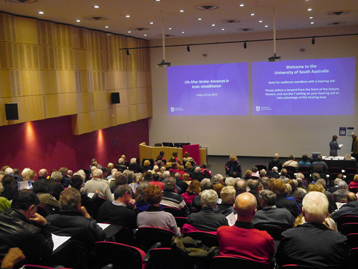
UniSA’s popular Successful Ageing Seminar series offers our alumni and the wider community an opportunity to access expert insights on health, lifestyle, and current topics.
Join us to hear the latest research on topical issues from some of UniSA’s leading thinkers.
Past topics have included positive ageing, laughter, developments in cancer research, personalised medicine, pain science, housing, legal issues, and citizen science. Recordings from past seminars are available below.
If you’d like to subscribe to email invitations for future seminars, please email giving@unisa.edu.au.
View the presentation 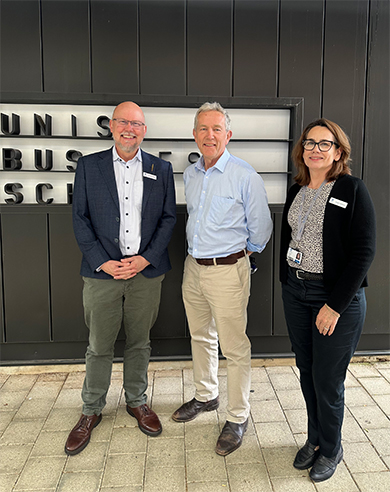 here
here
Professor Rick Sarre
Emeritus Professor of Law and Criminal Justice
UniSA Justice & Society
Seminar summary
Chief Advancement Officer Dr Colin Taylor introduces Professor Rick Sarre, who reveals where cybercrime came from, what it looks like, what governments are doing and should be doing to eradicate it, and what individuals can do to protect themselves.
View the presentation 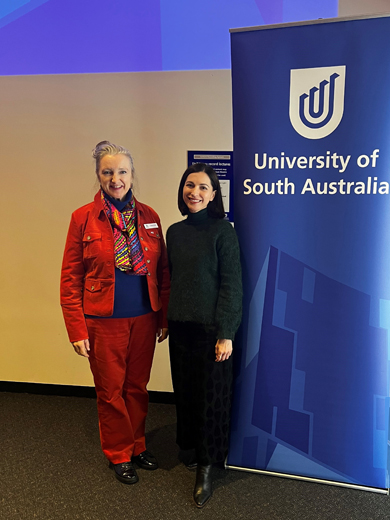 here
here
Dr Nadia Corsini
Senior Research Fellow: Rosemary Bryant AO Research Centre
UniSA Clinical & Health Sciences
Seminar summary
Advancement Executive Angela Gordon introduces behavioural scientist Dr Nadia Corsini who explores the link between social connection and healthy ageing. As the world has become more connected technologically, people have become more disconnected socially. Loneliness affects our health as much as smoking. Dr Corsini highlights the powerful steps we can activate in our local communities to make social connection the default again.
View the presentation 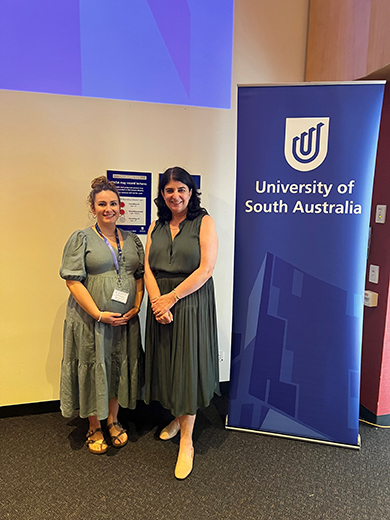 here
here
Presented by:
Dr Evangeline Mantzioris
Program Director: Bachelor of Nutrition & Food Sciences
UniSA Clinical & Health Sciences
Seminar summary
Advancement Executive Emily O’Brien introduces UniSA nutritional science expert Dr Evangeline Mantzioris as she explores the science behind diet and longevity. It’s all about the foods to eat, and those to avoid, to support healthy aging. From brain-boosting antioxidants, anti-inflammatory nutrients and gut-friendly fibres. Discover how simple dietary choices can keep you feeling strong, prevent disease, and promote a longer, healthier life - so you can live not just longer, but more importantly better.
View the presentation 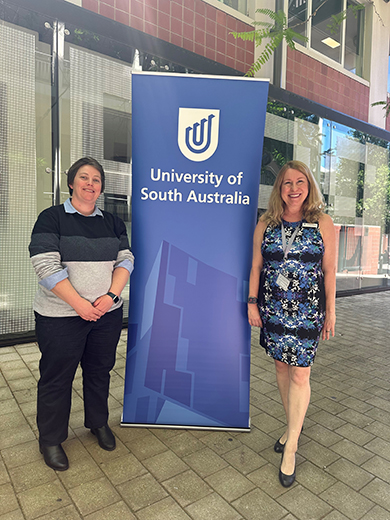 here
here
Presented by:
Associate Professor Ashleigh Smith
Associate Professor in Healthy Ageing
UniSA Allied Health & Human Performance
Seminar summary
Monique Littlejohn introduces expert in Dementia research, Associate Professor Ashleigh Smith, as she talks about the Small Steps towards dementia risk reduction project and co-designing, implementing and evaluating a first-of-its-kind personalised dementia prevention physical activity intervention.
View the presentation 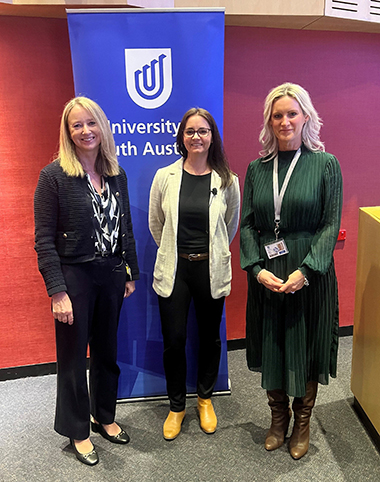 here
here
Presented by:
Professor Allison Cowin
Deputy Director
UniSA Future Industries Institute
Dr Xanthe Strudwick
Senior Research Fellow
UniSA Future Industries Institute
Seminar summary
Rebecca Foster introduces experts in regenerative medicine, Professor Allison Cowin and Dr Xanthe Strudwick as they discuss the combination of wound biology with the expertise of nanotechnologists, physicists and materials scientists that is leading to new products and approaches for wound management.
View the presentation 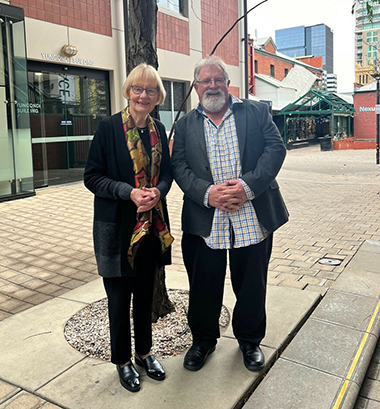 here
here
Presented by:
Dr Peter ‘Kevin’ O’Shaughnessy
Lecturer in Nursing
UniSA Clinical & Health Sciences
Seminar summary
Emeritus Professor Ruth Grant introduces nursing expert Dr Kevin O’Shaughnessy as he shares the “Secret Lives of Australian Men” campaign to address loneliness in men and promote mental wellbeing for cancer survivors.
Presented by: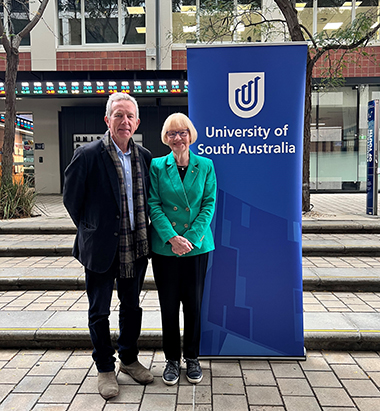
Professor Rick Sarre
Emeritus Professor
UniSA Justice and Society
Seminar summary
Emeritus Professor Ruth Grant introduces criminologist and legal expert Professor Rick Sarre as he discusses his new book Crime Prevention: what we know and what we need to do.
It is often reported that crime is on the rise and that increasingly we need to be aware of new trends such as cybercrime and online scams. Is this really the case, and if so, what can we do about it?
Prof Sarre’s new research highlights that a safe and secure community is best built on equality of opportunity, and the development of strong social capital and social investments that help build people’s lives constructively. It questions political spending choices regarding crime prevention (such as prioritising police and prisons) and the impact of these decisions on community safety.
Due to circumstances out of our control, a recording of this seminar is not available.
View the presentation 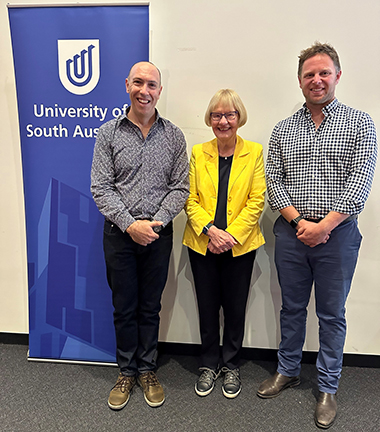 here
here
Presented by:
Professor Lorimer Moseley AO
Bradley Distinguished Professor
UniSA Allied Health & Human Performance
Dr Brenton Hordacre
Senior Lecturer in Physiotherapy
UniSA Allied Health & Human Performance
Seminar summary
Emeritus Professor Ruth Grant introduces leading neurorehabilitation researcher Dr Brenton Hordacre and world-renowned pain scientist Professor Lorimer Moseley AO from UniSA's Innovation, Implementation and Clinical Translation in Health (IIMPACT in Health) research centre.
Dr Hordacre speaks about the brain and optimising neuroplasticity, and Professor Moseley shares his extensive knowledge of the body, pain, and the sweet zone of adaptation.
View the presentation 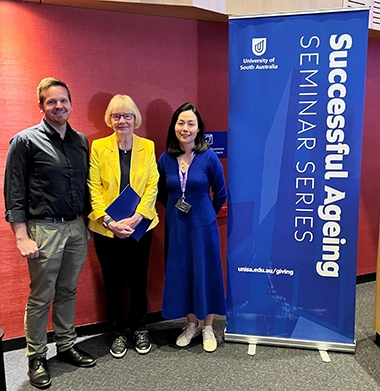 here
here
Presented by:
Associate Professor Fanke Peng
Enterprise Fellow
UniSA Creative
Dr Aaron Davis
Lecturer
UniSA Business
Seminar summary
Emeritus Professor Ruth Grant, seminar MC, welcomed the audience and introduced the speakers Associate Professor Fanke Peng and Dr Aaron Davis, who spoke about the latest developments in design thinking for health and wellbeing.
View the presentation 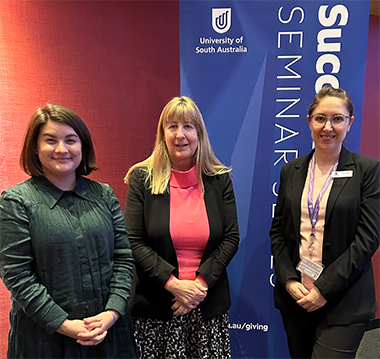 here
here
Presented by:
Dr Lyrian Daniel
Enterprise Fellow
UniSA Creative
Dr Debbie Faulkner
Senior Research Fellow
UniSA Business
Seminar summary
Two leading urban design and social housing researchers from UniSA shared insights on issues including heating our homes in an Australian climate, and affordable housing for lower income older people.
View the presentation 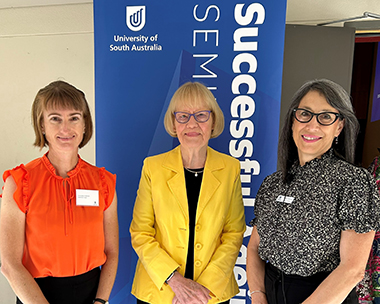 here
here
Presented by:
Associate Professor Gabrielle Todd
Associate Professor of Neuroscience
UniSA Clinical & Health Sciences
Dr Sue Sharrad
Senior Lecturer in Nursing
UniSA Clinical & Health Sciences
Seminar summary
Emeritus Professor Ruth Grant, seminar MC, welcomed the audience and introduced the speakers Associate Professor Gabrielle Todd and Dr Sue Sharrad, who spoke about the latest developments in diagnosing and caring for people living with Parkinson’s disease.
View the presentation 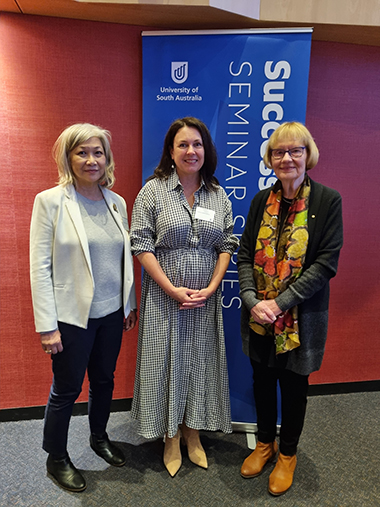 here
here
Presented by:
Professor Natasha Harvey
Director: Centre for Cancer Biology
Professor Yeesim Khew-Goodall
Head, Cell Signalling Laboratory, Centre for Cancer Biology
Seminar summary
Emeritus Professor Ruth Grant, seminar MC, welcomed the audience and introduced the speakers Professor Natasha Harvey and Professor Yeesim Khew-Goodall, who spoke about the world-class innovative research at the Centre for Cancer Biology making breakthrough discoveries in the fundamental causes of cancer, and translating these discoveries into new ways to prevent and treat this group of diseases.
View the presentation 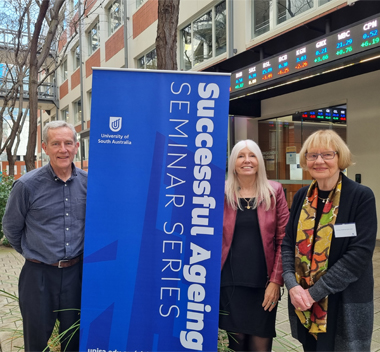 here
here
Presented by:
Professor Rick Sarre
Emeritus Professor/Adjunct Professor (UniSA Justice & Society)
UniSA Clinical & Health Sciences
Professor Eileen Webb:
Professor of Law UniSA Justice & Society
Seminar summary
Emeritus Professor Ruth Grant, seminar MC, welcomed the audience and introduced the speakers Professor Rick Sarre (criminology expert and legal commentator) and Professor Eileen Webb (human rights and elder law expert), who spoke about important legal issues we all need to be aware of as we get older, such as cybersecurity, contracts, insurance, nursing care, housing, advanced care directives, MyAgedCare, Wills, personal security, personal autonomy in making decisions, and elder abuse.
View the presentation 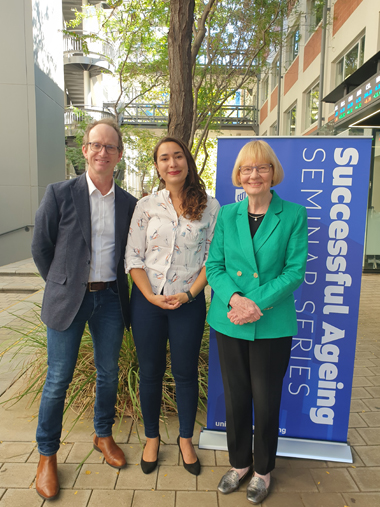 here
here
Presented by:
Professor Craig Williams
Dean of Programs (Pharmacy & Biomedical Sciences)
UniSA Clinical & Health Sciences
Larissa Braz Sousa
PhD student in citizen science and public health
Seminar summary
Emeritus Professor Ruth Grant, seminar MC, welcomed the audience and introduced the speakers Professor Craig Williams and PhD candidate Larissa Braz Sousa, who spoke about the power of engaging with nature and citizen science for healthy aging.
View the presentation 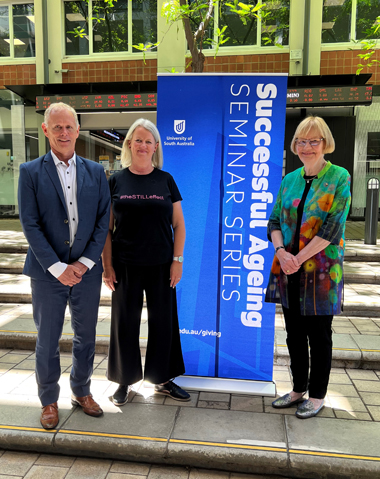 here
here
Presented by:
Dr Paul Bennett
Associate Professor in Nursing/ Program Director
UniSA Clinical & Health Sciences
Annie Harvey
Wellbeing Educator and CEO of The STILL Effect
Seminar summary
Emeritus Professor Ruth Grant, seminar MC, welcomed the audience and introduced the speakers Dr Paul Bennett (Kidney Researcher) and Annie Harvey (Wellbeing Educator), who invited the audience to participate in laughter and activities to increase their physical function and mental health.
View the presentation 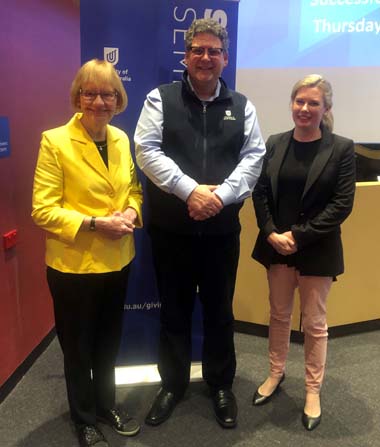 here
here
Presented by:
Professor Nicholas Procter
Chair: Mental Health Nursing
UniSA Clinical & Health Sciences
Dr Kate Gunn
Senior Research Fellow
UniSA Allied Health & Human Performance
Seminar summary
Emeritus Professor Ruth Grant, seminar MC, welcomed the audience and introduced the speakers Professor Nicholas Procter and Dr Kate Gunn, who spoke about the complex mental health challenges facing our nation, with over one in five Australians experiencing mental illness each year.
View the presentation 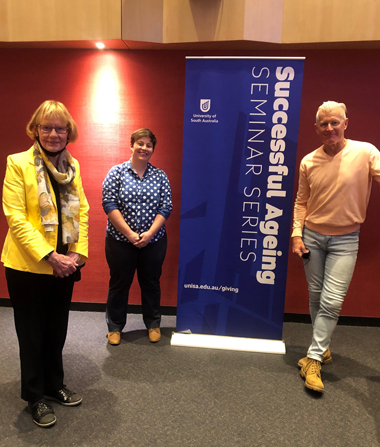 here
here
Presented by:
Professor Timothy Olds
Professor of Behavioural Epidemiology
UniSA Allied Health & Human Performance
Dr Ashleigh Smith
Senior Lecturer in Clinical Exercise Physiology
UniSA Allied Health & Human Performance
Seminar summary
Emeritus Professor Ruth Grant, seminar MC, welcomed the audience and introduced the speakers Professor Timothy Olds and Dr Ashleigh Smith, who spoke about the best use of our time — sleep, sitting, physical activity — for our health.
View the presentation 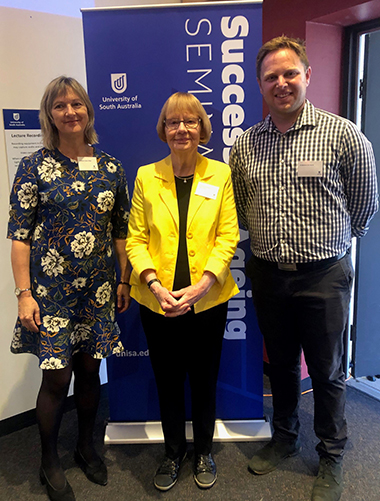 here
here
Presented by:
Professor Susan Hillier
Dean of Research
Allied Health & Human Performance
University of South Australia
Dr Brenton Hordacre
Senior Lecturer in Physiotherapy
University of South Australia
Seminar summary
Emeritus Professor Ruth Grant, seminar MC, welcomed the audience and introduced the first speaker, Professor Susan Hillier.
Professor Hillier presented background information on the human brain and how it can change (called neuroplasticity) and gave an overview of recent research at UniSA investigating how our experiences in early life can influence the way our brains respond to injury or disease later in life (called cognitive reserve).
After the break, Dr Hordacre spoke more specifically on current work looking at the way technology is being used to stimulate the brain – to measure the way it is working, to predict recovery after disease or injury or to change the way it is working e.g. in depression.
View the presentation 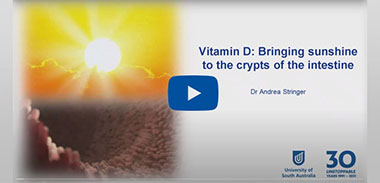 here
here
Presented by:
Dr Andrea Stringer
Deputy Director of Health and Biomedical Innovation in Clinical and Health Sciences
University of South Australia
Seminar summary
In this presentation, Dr Andrea Stringer talks about the role of Vitamin D in the gut, why it is important for gut health, its role in preventing some cancers and also, the side effects of some cancer treatments.
Andrea is developing strategies for preventing gastrointestinal damage following cancer treatments (mucositis) to reduce the burden of cancer, including identifying mechanisms underpinning damage that occurs following cancer treatments, investigating the microbiome, inflammatory cytokines, and the mucus barrier, focusing particularly on the protective effects of vitamin D.
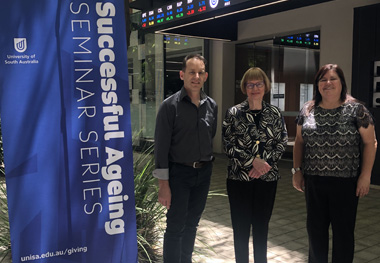 November 2019
November 2019View the presentation here
Presented by:
Professor Emily Hilder
Director: Future Industries Institute
University of South Australia
Associate Professor Albert Juhasz
Strand Leader and Barbara Hardy Chair in Environmental Science and Engineering
Future Industries Institute
University of South Australia
Seminar summary
Seminar MC, Emeritus Professor Ruth Grant, welcomed the audience and introduced the first speaker, Professor Emily Hilder.
Professor Hilder discussed how preventative healthcare relies on being able to accurately measure individual health markers and, from that, make informed decisions that can determine future wellbeing. She spoke on new approaches to make blood sampling less invasive and more patient centric.
After the break, Associate Professor Juhasz spoke on his research in predicting human exposure to environmental contaminants and ways in which such exposure may be minimised.
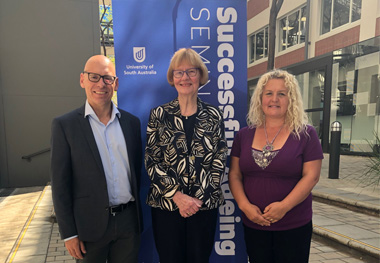 September 2019
September 2019View the presentation here
Presented by:
Associate Professor Rietie Venter
Head: Microbiology
School of Pharmacy and Medical Sciences
University of South Australia
Professor Clive Prestidge
Professor of Pharmaceutical Science
School of Pharmacy and Medical Sciences
University of South Australia
Seminar summary
Seminar MC, Emeritus Professor Ruth Grant, welcomed the audience and introduced the first speaker, Associate Professor Rietie Venter..
Associate Professor Venter spoke on the topic of resistant superbugs and the demise of antibiotics. She said that we are currently facing an antimicrobial resistance crisis where antibiotics are no longer able to control resistant infections. She discussed the superbugs that can resist treatments and the factors that are contributing to this problem, plus steps we are taking to discover and develop much-needed new antibiotics.
After the break, Professor Prestige spoke on his research into Nanomedicine and its role in combating superbugs and challenging infections.
Bacteria utilise many mechanisms to evade our current antibiotics, hence the increasing number of incurable infections and devastating influences to human health and mortality. Professor Prestige discussed how his research utilises nanomaterials and nano-carriers to enhance antibiotics’ performance and advance more efficacious anti-infective medicines.
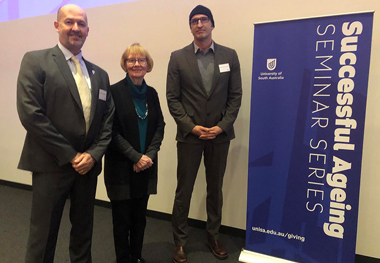 July 2019
July 2019View the presentation here
Presented by:
Professor Stuart Pitson
Research Professor, Centre for Cancer Biology
University of South Australia
Professor Peter Hoffmann
Strand Leader and Lloyd Sansom Chair in Biomaterials Engineering & Nanomedicine Future Industries Institute
University of South Australia
Seminar summary
Seminar MC, Emeritus Professor Ruth Grant, welcomed the audience and introduced the first speaker, Professor Stuart Pitson. Stuart’s presentation was on Glioblastoma, the most common malignant brain tumour in adults, and the need for new therapies.
Stuart highlighted his current research and discussed the cutting-edge platforms he is working in with his lab to identify new glioblastoma therapies and recent advances in developing such new drugs.
After the break, Professor Peter Hoffmann spoke about the prevalence of ovarian cancer in Australia and potential symptoms.
Peter discussed how important early detection is in ovarian cancer. He also showcased his game changing research in early detection by auto antibodies, and research into personalized treatment using a 3D cancer cell model.
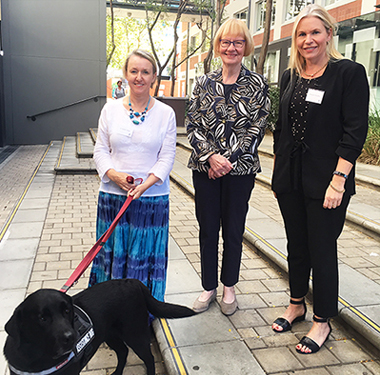
View the presentation here
Presented by:
Dr Karen Murphy
Senior Lecturer in Nutrition and Food Sciences
University of South Australia
Dr Janette Young
Lecturer in Health Sciences (Health Promotion & Health Services)
University of South Australia
Seminar summary
Seminar MC Emeritus Professor Ruth Grant welcomed the audience, and introduced the first speaker, Dr Karen Murphy. Karen’s presentation gave an insight into health benefits of dietary patterns, particularly the Mediterranean diet on the risk of cardiovascular disease and dementia.
She then highlighted her research findings that will help implement healthy diet and lifestyle choices that are sustainable in the longer term for healthy ageing. Karen showcased some Australian Mediterranean cookbooks with very simple recipes and pointed out that most pantries already had the main ingredients.
After the break, Dr Janette Young spoke about the positive impacts of pets as we age. Janette addressed the relationships between pets and human health, pets and aging and pets in our everyday lives. Janette also touched on the rights, welfare and wellbeing of the animals we share or live with.
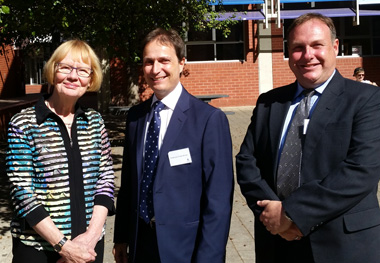 April 2018
April 2018View the presentation here
Presented by:
Dr Martin Belusko
Senior Research Fellow, Barbara Hardy Institute
University of South Australia
Professor Frank Bruno
South Australian Chair in Energy, Future Industries Institute
University of South Australia
Seminar summary
Seminar MC Emeritus Professor Ruth Grant welcomed the audience, and introduced the first speaker, Dr Martin Belusko. Martin’s presentation gave an insight of the global renewable energy transition that is currently underway. He also then provided an overview of how and why this transition is occurring and how South Australia represents one of the leading regions in this transition. Afterwards, Professor Frank Bruno presented on past and current research activities in the energy area at UniSA. Past research discussed included the evaluation of Seeley International’s innovative indirect evaporative cooling system (Climate Wizard). He also provided an assessment of the actual performance of insulation in Australian roofs and development and valuation of the energy guidelines for Australia’s most sustainable housing development, Lochiel Park. Frank then gave an overview of current research activities like the development of thermal energy storage systems using phase change materials for energy storage, and its application in refrigeration and for solar power plants.
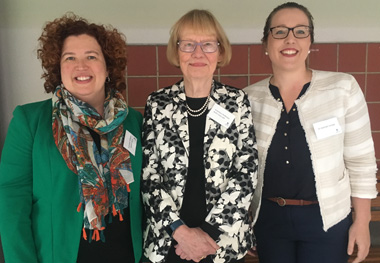 July 2018
July 2018
View the presentation here
Presented by:
Associate Professor Siobhan Banks
Co-Director of the Behaviour–Brain–Body Research Centre
University of South Australia
Dr Hannah Keage
Co-Director of the Ageing and Impairment Neurosciences (CAIN) laboratory
University of South Australia
Seminar summary
Seminar MC Emeritus Professor Ruth Grant welcomed the audience, and introduced the first speaker, Associate Professor Siobhan Banks. Siobhan’s presentation gave an insight into some of the most common sleep disorders such as insomnia, the amount of sleep needed to maintain healthy functioning and how normal sleep changes over the lifespan. She then debunked common myths about sleep and outlined the best ways to get a good night’s sleep at any age. Afterwards, Dr Hannah Keage presented on current evidence for the role of sleep in cognitive decline and dementia onset in late-life. She spoke about epidemiological work that has assessed associations between sleep characteristics and incident cognitive impairment, neurobiological studies that have assessed neural mechanisms underlying these associations, and introduced current interventional studies.
September 2018
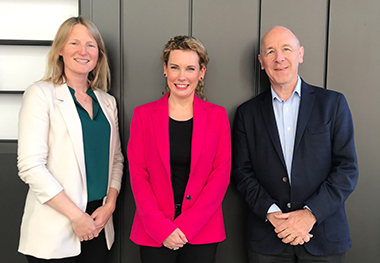
View the presentation here
Presented by:
Dr Kate Fennell
Research Fellow
University of South Australia
Professor Ian Olver AM
Institute Director, UniSA Cancer Research Institute
University of South Australia
Seminar summary
Seminar MC Ms Fern Cargill, UniSA Advancement Executive, welcomed the audience, and introduced the first speaker, Dr Kate Fennell. Kate’s presentation gave an insight into why people in rural areas affected by cancer experience poorer outcomes than those in urban areas. She then highlighting tried and tested strategies including the Country Cancer Support website and the Rural Cancer Stories YouTube Channel, along with new disparity-reducing ideas gathered on her recent Churchill Fellowship, which took her to India, UK, Netherlands, Canada and the US.
Afterwards, Professor Ian Olver AM illustrated the issues that are faced and overcome by rural patients with cancer by showing one of the rural patient support videos featuring Viv, a cancer survivor. He then highlighted research into the financial toxicity associated with cancer and its treatment, the challenges of looking after relatives at a distance and barriers to communication about cancer and its treatment, to be overcome by our Aboriginal cancer communication project.
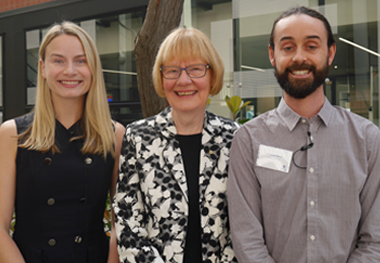 September 2017
September 2017View the presentation here.
Presented by:
Dr Tasha Stanton
Senior Research Fellow
University of South Australia
Dr Daniel Harvie
Clinical physiotherapist and pain investigator at the Recover Injury Research Centre
Griffith University
Seminar summary
Seminar MC Emeritus Professor Ruth Grant welcomed the audience, and introduced the first speaker, Dr Tasha Stanton. Tasha’s presentation explored the complexity of pain and revealed new findings from pain neuroscience, suggesting that how our body is represented in the brain may play an important role in our pain experience. Afterwards, Dr Daniel Harvie discussed some adaptive characteristics of pain as a protective system—characteristics which enable it to exist beyond healing and usefulness. His talk challenged the dominant tissue-focused view of ongoing pain, and introduced new ideas relating to learning and memory that better explain persistent pain.
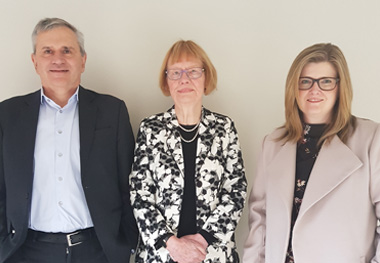
View the presentation here
Presented by:
Professor Andrew Beer
Dean: Research and Innovation
University of South Australia
Professor Wendy Lacey
Dean and Head of School: Law
University of South Australia
Seminar summary
After a welcome by Emeritus Professor Ruth Grant, the audience heard from Professor Andrew Beer who set the scene regarding the key issues regarding our ageing population and the challenges this presents for society and our aged care sector. Afterwards, Professor Wendy Lacey considered the importance of human rights protection and realisation in an ethical aged care framework. Focusing on the topic of food, Professor Lacey highlighted the importance of enabling older people continue to exercise their rights with autonomy and dignity for as long as they possibly can, while at the same time experiencing declining health outcomes.
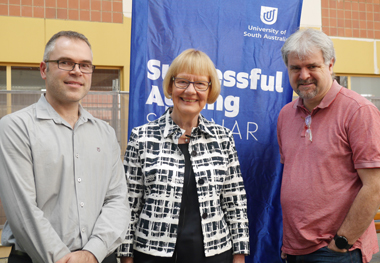
View the presentation here
Presented by:
Professor Mark Billinghurst
Professor of Human Computer Interaction
University of South Australia
Dr Ross Smith
Senior Lecturer and Co-Director of the Wearable Computer Lab, University of South Australia
Seminar summary
After a welcome from Emeritus Professor Ruth Grant, the audience heard from Professor Mark Billinghurst, a world-leading researcher in the field of innovative computer interfaces that can merge virtual and real worlds. Mark introduced guests to virtual reality, augmented reality and other innovative technologies. He highlighted some of the past challenges that technology has presented, but explained why this technology should be embraced. Dr Ross Smith then shared how virtual reality and other technologies are being applied across industries such as aged care and health. He highlighted some current projects that he is working on, sharing how virtual reality is being used in chronic pain therapy.
At the end of the seminar, attendees enjoyed a hands-on demonstration of some of the technologies they have heard about.
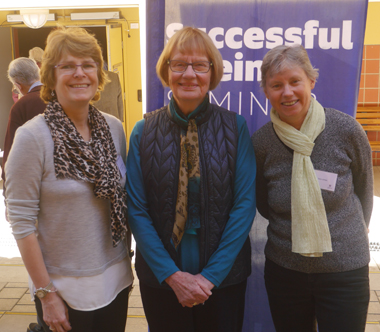
View the presentation here
Presented by:
Dr Sara Jones
Program Director: Podiatry
Division of Health
University of South Australia
Dr Sara Jones is an academic and podiatry practitioner with expertise in foot pressure patterns and health education. She is listed in the Australasian Podiatry Council’s Hall of Fame. As well as teaching and research that spans foot care, diabetes management and Aboriginal health, Sara is involved in forensic podiatry. Using her expertise in analysing footprints, impressions, footwear, and gait, she has assisted criminal investigations across Australia.
Associate Professor Gaynor Parfitt
Associate Professor of Exercise and Sport Psychology
Division of Health
University of South Australia
Gaynor is an exercise and sport psychologist who joined the University of South Australia in 2011. After an early career that focused on anxiety and performance in sport, Gaynor’s research interests changed to exercise psychology. This includes: the chronic and acute effects of exercise on psychological and physical well-being, motivational factors that may influence adoption and maintenance of physical activity, and methods of exercise intensity regulation to maximise psychological and physical benefits. Her research populations include individuals with chronic diseases, as well as sedentary and active individuals across the life-span.
Seminar summary
After a welcome from Emeritus Professor Ruth Grant, the audience heard from Dr Sara Jones, an academic and podiatry practitioner with expertise in foot pressure patterns and health education. Sara highlighted what our feet can tell the world and discussed some of the more common foot problems that are encountered in the community, as well as touching on her experience as a pioneer of forensic podiatry. Associate Professor Gaynor Parfitt, an exercise and sport psychologist, then discussed the effects of physical activity on the ageing process including physical functioning, cognitive performance and quality of life as we age.
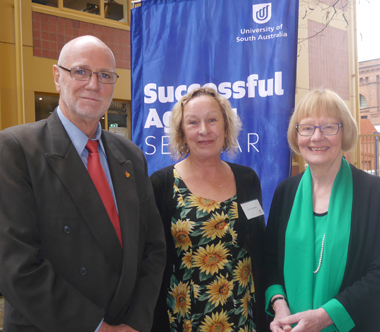
View the presentation here
Presented by:
David Sweet
Tutor & Lecturer, School of Communication
International Studies and Languages
University of South Australia
Dr Sue Anderson
Lecturer in Indigenous Cultures and Australian Society
University of South Australia
Seminar summary
After a welcome from Emeritus Professor Ruth Grant, David Sweet presented ‘What’s in your shoebox?'. Anyone can record their oral history and David recounted some of the oral history projects in which he has been involved. He discussed his approach, which is to open the literal and metaphorical shoeboxes of photographs and discover their stories. As well as providing insight into the importance of oral history from both a personal and academic perspective, David offered helpful advice on how one might structure one’s own oral history and resources available to assist with this.
Dr Sue Anderson then presented ‘What is Indigenous oral history?’. Sue highlighted that oral history is a significant tradition for Indigenous peoples across the globe. In Australia, the world’s oldest continuing cultures have engaged in oral history as a means of knowledge transmission for over 60,000 years. More recently, western ‘scientific’ thinking derived from the Enlightenment period has relegated oral history to the realm of the unreliable until this notion was challenged in the 1970s. Her talk explored the meaning of oral history to Aboriginal and Torres Strait Islander communities and its role in contemporary society.
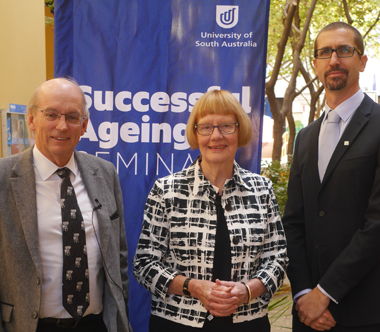
View the presentation here
Presented by:
LPrf John Ralston AO FAA FTSE
Emeritus Laureate Professor
University of South Australia
Emeritus Laureate Professor John Ralston is a physical and colloid chemist with complementary training in metallurgy. He has a distinguished international reputation in the interface between science and engineering. In 1994, John was appointed as the Founding Director of UniSA’s Ian Wark Research Institute (“The Wark”), serving until his retirement 2012. In 2007 John was awarded South Australian of the Year, the first scientist to be so honoured, as well as South Australian Scientist of the Year.
Dr Colin Hall
Senior Research Fellow, Future Industries Institute, University of South Australia
Dr Colin Hall is a Senior Research Fellow within the Thin Film Coatings Group at UniSA’s Future Industries Institute. The group focus on the commercial application of nano-composite coating technology and Colin works closely with the Australian manufacturing industry so that the latest innovative research is applied to create stronger, lighter and safer products.
Seminar summary
After a welcome from Emeritus Professor Ruth Grant, LPrf John Ralston provided an introduction to the role that nanotechnology and biotechnology plays in our modern day world. John discussed the importance of innovation, and engaging and educating the community to ensure that the latest nanotechnology innovations can come to fruition.
Dr Colin Hall then highlighted his work within the Thin Film Coatings Group at UniSA, discussing the commercial applications of nanotechnology research and its potential to revolutionise multiple industries.